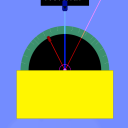Law of reflection
From Algodoo
Law of reflection
| Language: | English |
|---|---|
| Description: | The lesson is designed to lead students to discover the law of reflection on their own. Although this law is not difficult to grasp or remember, the process of self-discovery can be very rewarding. |
| Target: | Key Stage 4, Key Stage 5 |
| Category: | Laboratory |
| Discipline: | Optics |
| Learning objectives: |
|
| In class: | Start by asking students what it means for light to reflect. What useful tools in life use reflection? Make a list on the board.
Then ask students what would happen if the light reflected differently (at different angles, in different patterns, or reflected in random directions). How would this affect the usefulness of each tool listed? Then ask them if there is a pattern to the way light reflects. If they say yes, then challenge them to describe the pattern. If they say no, ask them how there can be no pattern if all of the above tools work based on reflection? Have them record their predictions on a separate sheet of paper for later comparison. Then have them explore the idea on their own using the following activity. |
Steps in Algodoo
CREATE A SCENE
Open the ‘Law of reflection’ scene above.
MAKE A PREDICTION
If students have not already, have them predict what the relationship is between the incident (initial) ray and the reflected ray.
RUN/INTERACT
Using the laser pointer on the wheel, shine it at the mirror at increments of 10° starting from the normal. On a separate sheet of paper, record the incident angle and the reflected angle using the green protractor for each increment.
EVALUATE
Based on your data, what pattern can you identify regarding the incident angle and reflected angle? What other situations, other than light, would this principle apply to (it applies to anything that bounces or reflects).
REVISE SCENE
Right click on the mirror and go to ‘geometry actions->transform into circle.’ Then move the circle straight down so that the laser hits the top of the circle exactly at the center of the inner-most purple circle. Make sure the laser is towards the normal before your do this.
MAKE A PREDICTION
How do you think a curved surface will change the law of reflection that you previously discovered?
RUN/INTERACT
Repeat the above process starting with the normal and record your incident angle and your reflected angle. Because of the shape of the circle, do not go past 60 degrees.




